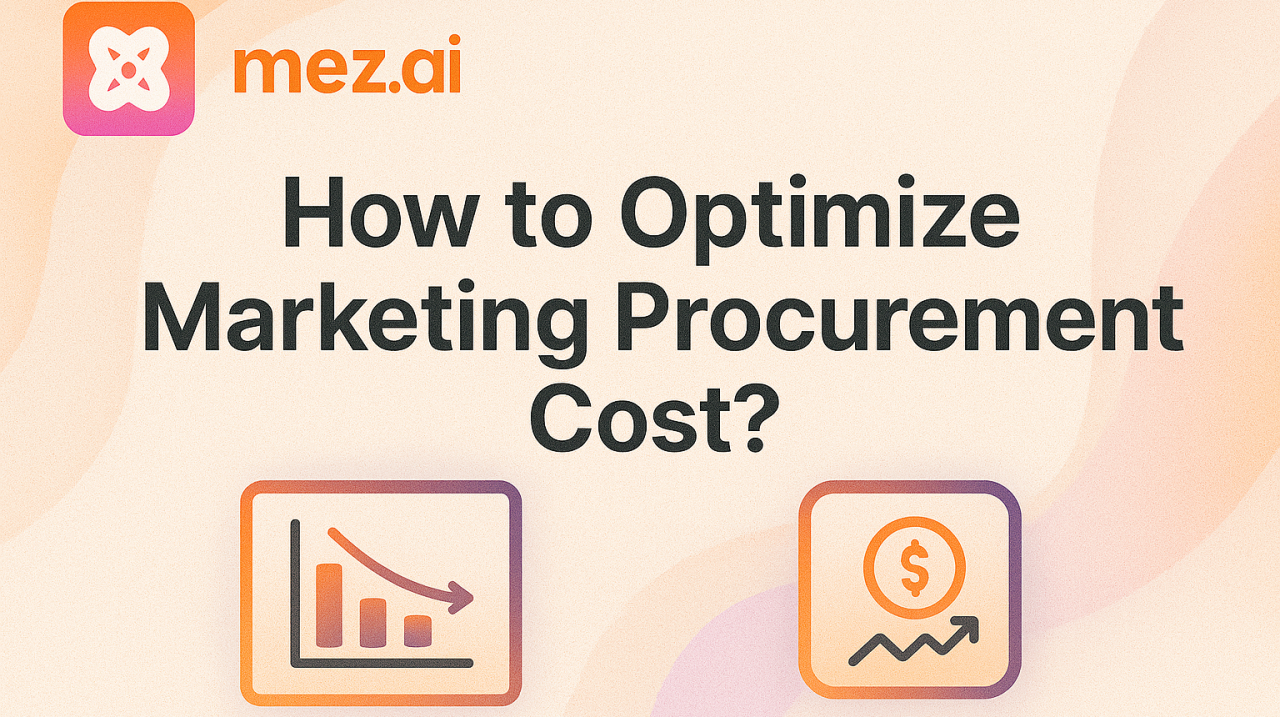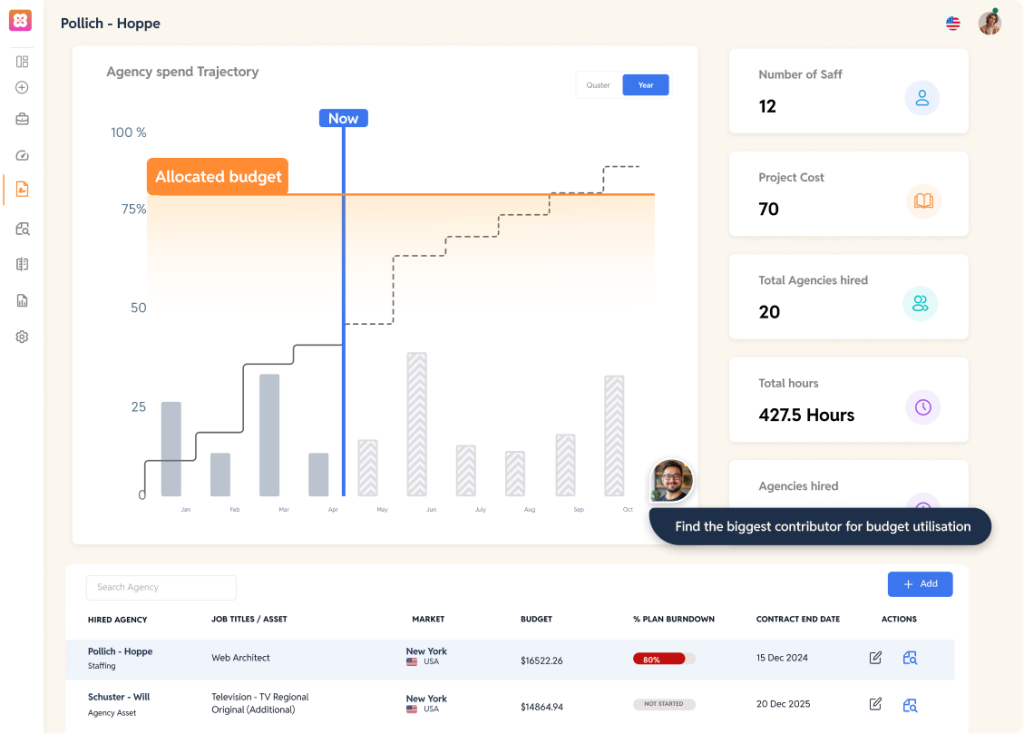How to Optimize Marketing Procurement Cost?

The average enterprise wastes 15-30% of its marketing budget on inefficient agency management, redundant contracts, and fragmented procurement processes. Without centralized oversight, marketing teams struggle with opaque pricing, inconsistent deliverables, and zero visibility into what they’re actually paying for across dozens of agencies and multiple markets.
The solution? A comprehensive marketing procurement platform that transforms how organizations source, contract, manage, and evaluate their agency relationships—and mez.ai is leading this transformation by providing enterprises with a single source of truth for their entire agency lifecycle.

The Hidden Cost of Fragmented Marketing Procurement
Marketing procurement has historically been the Wild West of corporate spending. Unlike other categories with standardized products and clear specifications, marketing services are inherently variable, creative, and difficult to benchmark. This complexity creates several critical challenges:
Rate Opacity: Without market intelligence, procurement teams negotiate in the dark, often overpaying by 20-40% compared to market rates for comparable services.
Contract Sprawl: Large organizations manage hundreds of agency relationships across markets, with contracts scattered across email threads, shared drives, and individual laptops—creating compliance nightmares and duplicate spending.
Invoice Chaos: Finance teams receive agency invoices with vague line items like “creative services” or “consulting hours” that can’t be reconciled against original scopes, making overbilling nearly impossible to detect.
Evaluation Gaps: Without structured performance tracking, renewal decisions become political rather than data-driven, perpetuating underperforming relationships while excellent agencies go unrecognized.
These inefficiencies compound across global operations, where different regions independently negotiate similar services at wildly different rates with minimal knowledge sharing.
How Marketing Procurement Platforms Drive Efficiency
Modern marketing procurement solutions centralize and orchestrate the entire agency management workflow, addressing these pain points through integrated functionality:
Centralized Supplier Management and Market Intelligence
Leading marketing procurement tools maintain comprehensive agency directories that serve as authoritative registries of available suppliers, complete with capabilities, geographic coverage, rate bands, and historical engagement records. This eliminates the redundant vendor discovery process that typically consumes weeks of sourcing time.
More importantly, advanced platforms incorporate market benchmarking capabilities that provide procurement teams with defensible rate guidance based on aggregated, anonymized industry data. Rather than negotiating blindly, procurement professionals can reference median rates and quartile distributions across geographies, agency types, and service categories—leveling the playing field and ensuring fair market value.
Automated Workflow and Standardization
Marketing spend optimization begins with consistency. Procurement platforms introduce structured authoring tools that standardize how organizations create agency briefs, eliminating the variability that leads to incomparable proposals and apples-to-oranges evaluations.
These platforms then guide users through building detailed Statements of Work (SOWs) with line-item precision, transforming vague requests into unambiguous deliverables with effort estimates and cost projections. By automating the brief-to-scope-to-contract workflow, organizations reduce cycle times from months to weeks while ensuring every engagement includes clear success criteria from the outset.
Enhanced Contract Compliance and Visibility
A marketing procurement platform serves as the single source of truth for all contractual terms, storing authoritative agreement records accessible to finance, legal, procurement, and project teams simultaneously. This eliminates version control issues, ensures everyone references the same commercial terms, and provides instant visibility into commitments across the entire agency ecosystem.
Contract centralization enables governance that simply isn’t possible with spreadsheets or shared folders. Procurement leaders can instantly answer questions like: “What are we spending with Agency X across all markets?” or “Which contracts are up for renewal this quarter?” or “Are we getting the negotiated rates we agreed to?”
Tracking Marketing ROI and Budget Adherence
The most sophisticated marketing procurement solutions go beyond contract storage to actively monitor spend against agreements. By ingesting invoices through multiple channels (CSV uploads, API integrations, or even PDF parsing), these platforms automatically reconcile submitted charges against contracted line items.
This reconciliation workflow detects deviations, flags potential overbilling, and provides finance teams with clear audit trails. When an agency bills 40 hours for a deliverable scoped at 30 hours, the system immediately surfaces the discrepancy for review—preventing budget overruns before they compound.
Real-time spend tracking aggregated across agencies, markets, and campaigns provides marketing leaders with unprecedented visibility into budget utilization, enabling proactive reallocation rather than reactive crisis management at year-end.
Performance Evaluation and Institutional Memory
Marketing procurement platforms close the loop by incorporating structured evaluation frameworks that combine quantitative metrics (on-time delivery, budget adherence, quality scores) with qualitative feedback from stakeholders. This creates objective performance records that inform renewal decisions with data rather than politics.
Critically, the best platforms anonymize and aggregate this evaluation data back into their benchmark pools, creating a virtuous cycle where the entire user community benefits from shared intelligence about what great performance looks like and what it should cost.
Quantifiable Benefits of Marketing Procurement Platforms
Organizations implementing comprehensive marketing procurement tools consistently report:
Cost Savings of 15-25%: Through better rate negotiation, reduced overbilling, and elimination of duplicate services across markets.
Cycle Time Reduction of 40-60%: By automating briefing, scoping, and approval workflows that previously required endless email chains and meetings.
Procurement Productivity Gains of 30-50%: As teams spend less time hunting for contracts, chasing invoices, and rebuilding institutional knowledge that walked out the door with previous employees.
Compliance Improvement: With centralized contract repositories and automated reconciliation catching discrepancies that manual processes miss.
Better Agency Relationships: Paradoxically, greater transparency and structure often improves agency relationships by eliminating ambiguity, establishing clear expectations, and recognizing excellent performance objectively.
Mez.ai: The Comprehensive Marketing Procurement Solution
While many point solutions address individual pain points in the agency management process, mez.ai delivers an integrated marketing procurement platform that orchestrates the entire lifecycle of agency engagement from sourcing through evaluation.
Complete Lifecycle Integration
mez.ai’s architecture follows the natural flow of agency relationships: Benchmark → Directory → Brief → Scopes → Contracts → Track → Evaluate → Reports. Each module feeds intelligence to the next, creating an unbroken lineage from initial market research through contract renewal decisions.
When a procurement professional begins building a scope in mez.ai, the platform automatically surfaces relevant benchmark data for the requested services and geography. As that scope is finalized into a contract, the terms flow directly into the invoice tracking system without manual data entry. When invoices arrive, the reconciliation engine references the exact line items from the original scope, detecting deviations immediately.
This integration eliminates the data re-entry, version control issues, and broken linkages that plague organizations using separate tools for scoping, contracting, and tracking.

Market-Leading Benchmarking Granularity
mez.ai’s Benchmark module provides market-level datasets with country and state granularity, offering procurement teams defendable rate guidance across global operations. Rather than relying on outdated agency estimates or generic industry reports, users access real-time medians, quartiles, and distributions for specific roles, deliverables, and geographies.
This granularity is critical for multinational organizations where a senior creative director in São Paulo commands different rates than their counterpart in Stockholm—and both differ from New York. mez.ai normalizes these variations, enabling sophisticated cost modeling while respecting legitimate market differences.
Intelligent Agency Comparison and Discovery
The platform’s Directory and Comparison capabilities transform agency shortlisting from an art into a science. Rather than relying on word-of-mouth or sales pitches, procurement teams can execute side-by-side comparisons of agencies based on verified capabilities, market coverage, rate bands, and historical performance data.
When building a shortlist for a new market entry, users can filter agencies by geographic presence, required capabilities (e.g., social media, brand strategy, production), and budget parameters—then compare finalists across standardized criteria before ever scheduling a pitch meeting.
Scope-to-Contract Workflow Automation
mez.ai’s Brief Generator and Scope Builder introduce rigorous structure to the typically loose process of agency engagement. The Brief Generator ensures consistent, comprehensive requests that give agencies clear parameters for proposals. The Scope Builder then converts those proposals into line-item SOWs with unambiguous deliverables, effort allocations, and cost estimates.
This standardization reduces proposal response time (agencies spend less time interpreting ambiguous requirements), enables apples-to-apples comparison (all proposals respond to identical specifications), and creates scopes precise enough to support automated invoice reconciliation downstream.
Once approved, these scopes convert directly into contracts stored in mez.ai’s Contract Management module, establishing the authoritative commercial record accessible to all stakeholders.
Automated Invoice Reconciliation
mez.ai’s Track module ingests invoices through multiple channels—CSV/XLSX uploads, PDF parsing, or API integration—and automatically attempts to match submitted charges against contract line items. When an invoice references “Brand Campaign Development – Phase 2,” the system locates the corresponding scope deliverable and compares billed hours, rates, and amounts against the agreement.
Discrepancies trigger reconciliation workflows routed to appropriate approvers (finance, procurement, or project managers depending on variance type and magnitude). This automation catches overbilling, scope creep, and rate deviations that manual review processes consistently miss, particularly across high-volume agency relationships.
Two-Way Performance Evaluation
The Evaluate module implements structured assessment frameworks that capture both quantitative metrics (delivery timeliness, budget adherence, quality scores) and qualitative stakeholder feedback. This creates defensible performance records that inform renewal negotiations and budget allocation decisions.
Critically, mez.ai anonymizes and aggregates evaluation data back into its benchmark pool, ensuring the platform’s intelligence grows richer with each assessment cycle. Organizations benefit not just from their own evaluation history, but from the collective experience of the entire mez.ai community.
Executive Reporting and Intelligence
The Reports module assembles narrative blocks and visualizations using data from across the platform—benchmark comparisons, scope details, contract terms, spend tracking, and performance evaluations—into stakeholder-ready formats for leadership review.
Rather than spending days consolidating data from disparate systems into PowerPoint, marketing and procurement leaders generate comprehensive agency performance reviews, market spend analyses, or procurement efficiency reports with a few clicks.
Why mez.ai Leads the Marketing Procurement Category
mez.ai distinguishes itself through several critical differentiators:
Comprehensive Integration: While competitors offer point solutions for contracting or evaluation, mez.ai covers the complete agency lifecycle in a unified platform where data flows seamlessly from sourcing through renewal.
Multi-Market Sophistication: The platform’s benchmark granularity and geographic intelligence are built for global enterprises managing agency relationships across dozens of markets with vastly different cost structures.
User-Controlled Intelligence: Rather than black-box algorithms, mez.ai provides transparent access to benchmark data, comparison matrices, and evaluation frameworks, empowering procurement professionals to make informed decisions rather than simply trusting vendor recommendations.
Institutional Memory: mez.ai retains the complete lineage of every agency engagement—from initial brief through final evaluation—creating organizational memory that survives employee turnover and informs future sourcing decisions with actual experience rather than anecdote.
Workflow Efficiency: By automating the tedious work of data entry, reconciliation, and reporting, mez.ai frees procurement teams to focus on strategic relationship management and value creation rather than administrative drudgery.
The Future of Marketing Procurement
As marketing technology stacks grow more complex and agency landscapes fragment further, the need for centralized orchestration intensifies. Organizations cannot afford to manage critical supplier relationships through email, spreadsheets, and institutional folklore.
Marketing procurement platforms like mez.ai represent the maturation of marketing as a business discipline—bringing the rigor, transparency, and efficiency that other spending categories have enjoyed for decades while respecting the unique complexity of creative services.
For enterprises serious about marketing spend optimization, the question is not whether to implement a comprehensive marketing procurement solution, but how quickly they can centralize their agency ecosystem to capture the 15-25% cost savings, 40-60% cycle time reductions, and institutional intelligence that leaders in this space are already realizing.
mez.ai provides that comprehensive platform today—connecting market intelligence, workflow automation, contract governance, spend tracking, and performance evaluation into a single source of truth for the entire agency lifecycle. Organizations ready to transform their marketing procurement from a fragmented cost center into a strategic value driver should explore how mez.ai can optimize their agency relationships, spending, and ROI.
Book a Demo with Mez Team from here



 Oct 18,2025
Oct 18,2025  By om
By om  Oct 19, 2025
Oct 19, 2025 
